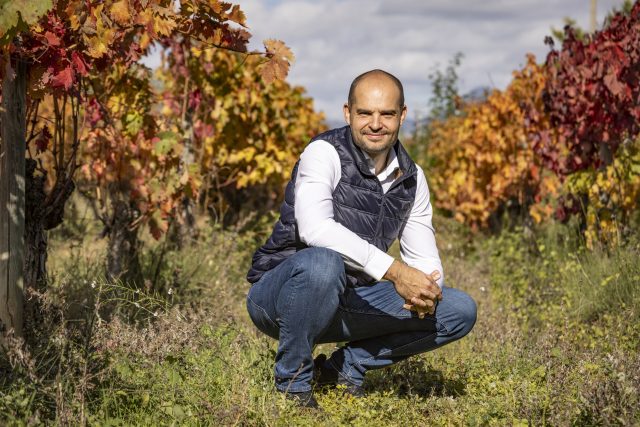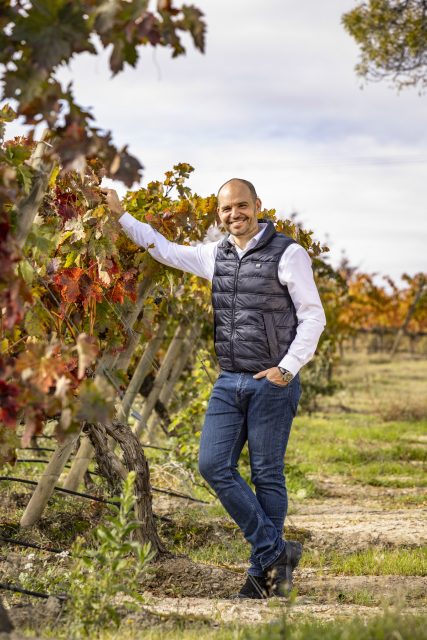This website uses cookies so that we can provide you with the best user experience possible. Cookie information is stored in your browser and performs functions such as recognising you when you return to our website and helping our team to understand which sections of the website you find most interesting and useful.
Master Winemakers Top 100: Juan José Díez
Juan José Díez, winemaker at Bodegas Faustino, features as one of our top winemakers in this year’s Master Winemaker 100 guide. He speaks to db about patience, the mistake “all winemakers dread” and the sub-region that is the future of Faustino.

An agricultural engineer with a degree in winemaking, Díez’s passion is rooted in his family’s connection to the countryside and farming. He began his career as a harvest assistant before gradually passing through every position in the winery, and has spent the last seven years as a winemaker on the Faustino team. It is a source of great pride to Díez that owners the Martínez Zabala family have chosen someone with a traditional background on the land to help them work towards an innovative future.
His Faustino & Eneko 2016 and his Faustino Gran Reserva 1991 won Master medals at the Rioja Masters 2019.

Describe your winemaking approach in no more than three words.
History, innovation and passion.
What’s your favourite part of the job?
The final blend of the wines. This is the moment when you can see the result of all your prior efforts. Every detail is crucial, as your decisions will ultimately determine the nuances that can make a wine excellent.
Which aspect of the job keeps you awake at night?
Truly, the harvest season is a pivotal moment in the winemaking calendar, when the greatest number of decisions must be made. The quality of our wine is not solely within our control; it depends on grape health, ripeness, weather conditions, the logistical intricacies of the harvest – and so much more. Many decisions are concentrated in a very short period of time.
What’s your go-to drink at the end of a long day?
A glass of wine with my family and friends. It’s incredible how mood, surroundings and company can influence the wine-tasting experience.
What’s the best piece of advice you’ve ever been given?
My father told me to always maintain the curiosity of a learner and the patience of a wise person.
What was your greatest winemaking mistake?
Making a mistake with the harvest date. I think all winemakers dread this error. When the harvest is over, especially for red grapes, and we look back, we always think we either began too soon or too late.
What’s the most important winemaking lesson you’ve learned so far?
These are two valuable lessons for me: to plan for the long term without neglecting the everyday details; and that the best winemaker is nothing without a great team behind them.
Which figure outside the world of wine inspires you?
We could talk about great political leaders, entrepreneurs or athletes, but I find that it is my family that truly inspires me, shapes my character, fuels my drive for improvement and influences my world view. Without them, I wouldn’t be the same.
Where would your fantasy vineyard be?
Certainly in Laguardia, Rioja Alavesa. Currently, we have vineyards with Tempranillo and Graciano grapes that are over 40 years old, located at an altitude of over 700 metres and protected by the Cantabrian Mountains. We are certain that this is the future of our wines.
If you weren’t a winemaker, what would you be doing and why?
Food biotechnology. I believe that there is a fascinating and boundless world that we’re currently exploring, where microbiology can assist us in our everyday life.

What’s the most memorable food match you’ve had with one of your wines?
Fortunately, the world of wine has brought me many experiences. However, my favourite pairing remains the family dinners with our traditional “sobremesa”, when you can enjoy for a couple of hours excellent wine and good conversation with loved ones.
What role does sustainability have to play in a Master-winning wine?
That is a 360-degree concept. It goes beyond just focusing on biodiversity in the vineyard; it influences every step in the winemaking process. It involves environmental efforts to minimise emissions and enhance winery efficiency, addresses social aspects concerning team and supplier relationships, supports local culture and community, and much more.
Which type of wine do you drink most regularly?
Outside of work, I enjoy sipping on white wines from different regions and, if I have to pair it with a meal, it’s got to be a Rioja crianza.
Your home is on fire: which bottle do you save?
I have a special gift from our former winemaker. Upon his retirement, he gave me a bottle of Gran Reserva Faustino from my birth year. I want to save this bottle with the intention of one day presenting it to my successor.
What are your top three markets and importers?
UK (Amber Beverage Group)
Switzerland (Escher SA)
Ireland (Richmond Market).
And which market would you most like to enter?
We’d like a stronger presence in South Korea.

Related news
Marqués de Cáceres matches terroir to winemaking
Ribera del Duero challenges 'out of date' perceptions in UK market

